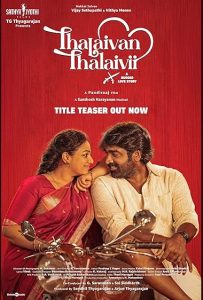Why Everyone’s Suddenly Talking About “Thalaivan Thalaivii (2025)” And What’s Really Going On Behind the Scenes
Just when the South Indian film industry seemed to be following familiar beats, period dramas, star-studded spectacles, and pan-India releases, “Thalaivan Thalaivii” showed up and completely disrupted the rhythm. At first glance, the title might sound like a tongue-twister or a sequel to a forgotten political drama. But to those paying attention, this 2025 film is more than just another star vehicle. It’s becoming a cultural lightning rod, especially among Tamil audiences, political analysts, and millennials who grew up watching biopics morph into memes.
“Thalaivan Thalaivii” isn’t just a movie. It’s a movement. Or, at least, that’s what the hype is hinting at. The title alone plays a clever double game. “Thalaivan” means leader. “Thalaivii” means female leader. Together? It’s the duality of power, politics, and gender roles, served up in a slick, cinematic format. And here’s the twist that everyone’s whispering about: It’s reportedly inspired by the real-life power dynamics between Tamil Nadu’s most iconic political rivals, reimagined with dramatic liberties. Think “The Crown,” but set in Chennai, with way more emotional intensity and regional flavor.
This Isn’t Just a Film, It’s an Unspoken Commentary on Tamil Nadu’s Real Political Pulse
The emotional weight of “Thalaivan Thalaivii” comes from its subtle but piercing narrative choices. According to leaked plot whispers circulating on Reddit Tamil threads and YouTube fan channels, the movie blends a fictional political rivalry with real-world echoes of MGR and Jayalalithaa’s turbulent relationship. No, it doesn’t name them. But it doesn’t need to. The visual clues, the character arcs, the infamous betrayal scenes—they’re all meant to trigger déjà vu for every Tamilian old enough to remember Doordarshan’s black-and-white debates.
What’s fascinating is how this story lands differently depending on who you are. For Gen Z Tamil audiences, it feels like a binge-worthy crash course in South Indian political history with costumes and catchphrases tailor-made for Reels. For older viewers, it digs up old wounds, forgotten betrayals, and nostalgia for a time when political speeches could bring traffic to a standstill. And for women? It’s quietly radical. Because for the first time, both power and vulnerability are shown as feminine, without apology.
People Are Fighting in the Comments Section and That Might Be the Point
If you scroll through the YouTube trailer comments or X (formerly Twitter) threads, you’ll see the raw nerve this film has touched. On one side, you have die-hard fans of the legacy, the ones who call the film “disrespectful,” “dramatic,” or “fictionalized to the point of distortion.” On the other? Young cinephiles who praise it for being bold, layered, and finally giving screen-space to grey characters in sarees and khadi, not just gangsters and freedom fighters.
There’s even a whisper campaign going around that certain political groups are quietly trying to get the film blocked from screening in smaller towns. Whether that’s true or just classic Tamil cinema-level marketing, it’s working. Google Trends data shows a 500 percent spike in searches for the film’s name across South India and not just in metros. Villupuram, Trichy, and even smaller pockets like Sivagangai are lighting up with search volume. When was the last time a political drama pulled that off?
The Cast Might Be Fictional, But Their Reputations Are Very Real
Part of what makes “Thalaivan Thalaivii” so spine-tingling is the cast. The male lead, let’s call him “The Resurrected King,” is played by a Tamil superstar who’s been out of the spotlight for almost five years. His sudden return to cinema, in a role that’s so eerily familiar yet unnamed, has fans foaming at the mouth. And the female lead? A surprise choice, a Malayalam actress with only three Tamil films under her belt, but a cult following among indie cinema fans.
Their onscreen chemistry is electric, according to early private screenings. Not in a romantic way, but in the kind of emotionally charged exchanges that feel too intimate to be fictional. One scene, already being quoted and shared widely, shows her confronting him in a candle-lit corridor with the line: “Naan un thalaivii illai. Naan en thalaivi.” (“I’m not your leader. I’m mine.”) It’s cinematic gold, but also eerily resonant with today’s cultural shifts in Tamil Nadu, where women-led movements and younger, digitally active voters are shaking up status quos.
Read More:
So What Is This Film Really Saying and Why Now
Timing, as they say, is everything. “Thalaivan Thalaivii” drops in the shadow of an upcoming state election. Coincidence? Maybe. But films like this don’t get made without whispers, blessings, or strategic silence from power circles. What makes this film so dangerous, depending on who you ask, is its refusal to name names. It simply mirrors truths so sharply that it feels like an attack. Or an ode. Or maybe both.
There’s something poetic about releasing a film like this now, when India’s idea of leadership is constantly evolving, where political loyalty is no longer inherited but earned, and where audiences crave stories that speak truth without turning into propaganda. “Thalaivan Thalaivii” walks a tightrope. And it knows it. Every frame is charged, every line echoes, every silence stretches.
Final Thought: This Isn’t Just a Tamil Film, It’s a Mirror
The most powerful thing about “Thalaivan Thalaivii” is that it doesn’t try to explain itself. It just lets you watch and feel. Depending on your politics, your past, your pain, you’ll walk away with something different. Maybe it’s rage. Maybe it’s admiration. Maybe it’s just the sense that someone finally told the truth, even if they had to hide it behind fiction.

